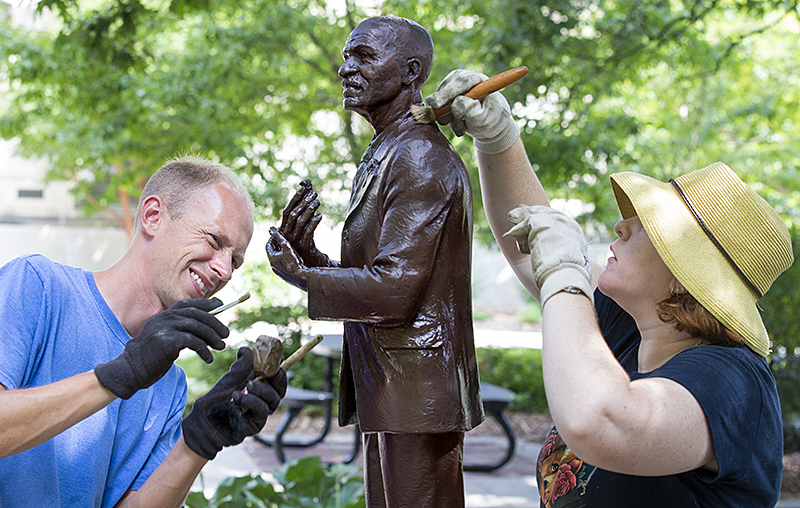No one knows the origin of the mistaken notion that free expression on campus was confined to a few designated free speech zones. Perhaps it started in 1986 when student leaders honored a longtime mathematics professor and civil liberties activist with a small stone wall and plaque near the Hub that read "Edward S. Allen Free Speech Platform."
The plaque and wall disappeared during the Hub renovation last summer. But the misleading phrase "free speech zone" had crept into university jargon, generally in reference to the Allen space and a couple of other spots on campus that were considered good rally spots.
That phrase led some to believe that any campus locale not designated as a "free speech" area was off limits to free expression.
"That's never been the case," said ISU policy administrator Sheryl Rippke. "Free expression is encouraged throughout campus."
However, lingering confusion and a request from student government prompted President Steven Leath to direct an ad hoc group to clarify the policy regarding free expression. Cole Staudt, student government president, and Reginald Stewart, vice president for diversity and inclusion, played key roles in developing new guidance resources, as well as in clarifying the policy, Rippke said.
That policy -- officially called the "Facilities and Grounds Use, Activities" policy -- applies to all kinds of gatherings on campus, from a lone speaker orating at the Hub to large public events involving stages and microphones.
The policy was revised over the spring and summer, and recently, was posted to the university policy library.
"The revised version doesn't change any of the rules," Rippke said. "But it's streamlined and easier to read. And it emphasizes that Iowa State, as part of its mission, encourages expressive activities throughout the university. It welcomes the university community and public to make use of university facilities and grounds, as long as activities are noncommercial and don't substantially interfere with university activities."
Here are key elements of the policy.
Outdoor areas
Members of the university community or public may express themselves at any unrestricted outdoor area on campus without giving notice as long as they meet a few conditions. For example, their activities must be noncommercial, occur between 8 a.m. and 10 p.m., be located 100 feet away from classroom buildings, and not interfere with walkways or building access. If the area hasn't been scheduled by another person or group, an individual can just walk up and start talking. (Outdoor restricted areas include such places as residences, farms, utility tunnels and facilities used for intercollegiate athletics or federal or national labs.)
Bigger events, indoor or outdoor
Outside activities that organizers reasonably anticipate might draw more than 50 people or indoor events that draw more than 15 are considered public events. Organizations and groups must contact university offices (specified in the policy) to get approval for these activities.
Indoor areas
Any use of indoor areas must not interfere with university programs and events. Activities also should be compatible with the purpose of the area or facility. (For example, requests to put a dunk tank in the foyer of a building or set up portable grill near a residence hall food court likely would not be approved.) Organizations and groups that wish to use university buildings for meetings, events and conferences must contact relevant offices (listed in the policy) to determine availability and usage fees. Some indoor areas aren’t available for nonuniversity-related assembly or solicitation. These include hallways, stairways, waiting rooms, residence and dining facilities, work rooms and health facilities.
Good places to rally, talk
The policy notes two areas on campus that are particularly conducive to public gatherings (centrally located, high traffic, won't interfere with building access) and refers to them with an ancient Greek word meaning gathering place -- "agora" (pronounced AG-or-uh). The popular areas are:
- West and south of the Hub. A new marker recognizing Edward Allen will be placed in the vicinity.
- South of the campanile
General rules
The policy also includes general rules about use of university property, displaying non-instructional materials and access to facilities.

